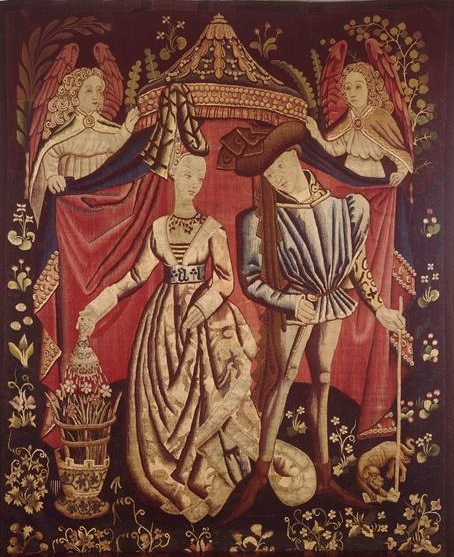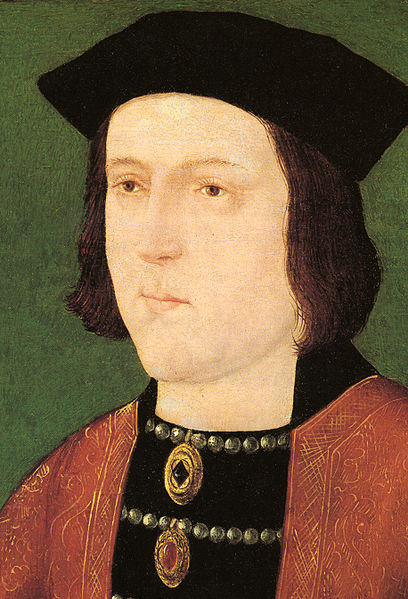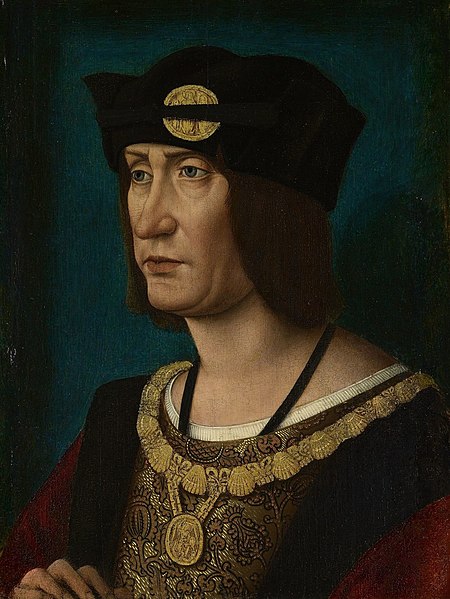T
he English, prodded by
their ally Philip of Burgundy, finally agreed to accept the sum of 200,000 ecus
for Charles[i], who was released on 5th
November 1440 having spent over half his life in exile from home. A number of
his estates were sold to pay the monies owing, but even so it was not until
1514 that Louis XII[ii]
paid the outstanding amount. Charles’ brother Jean was not released until 1445.
Jean d’Angoulême stayed as hostage until the majority of the ransom was paid.
| Charles d'Orleans in the Tower of London |
Charles’
third marriage was to Marie of Cleves, the 14 year old daughter of the Duke of Cleves. The couple
were married on 27th November 1440 at St Omer; three weeks after
Charles return from England. The marriage was arranged by Philip of Burgundy,
Marie’s uncle. Marie’s dowry was swallowed up as part of the ransom payment.
The newly wedded couple moved to live at the chateau of Blois, which Charles
rarely left and spent much of his time beautifying the chateau and adding to
his library. Like her husband Marie was a poet, who also enjoyed hunting and
dancing.
Family Troubles
 |
| Charles and Marie |
In the
spring of 1442 a conference at Nevers, Charles, in accordance with his promise
to the English, tried to create an accord between the two nations. The capture
of Pointoise the previous autumn had boosted the French king’s confidence.
In 1450 the
French recovered Normandy, with towns surrendering as soon as the army hove
into sight. The English stronghold of Aquitaine was now little more than a pale
around Bordeaux. In 1453 the last of the English strongholds outside the
Bordeaux area, Castillon, fell and with it the last of the great English
leaders Lord John Talbot. And in that year his Valois
inheritance struck Henry VI; his first bout of madness ensued.
Francesco Sforza
Francesco Sforza, married to Bianca the illegitimate
daughter of the last Visconti Duke of Milan, marched on the city and entered it
in 1450, following a series of political and military victories. He proclaimed
himself duke. Through his mother Valentina, daughter of the first Duke of
Milan, Charles laid claim to the Duchy of Milan, but he could not afford the troops
to press for his rights[iii]; nor to the title of
Count of Asti that he had inherited from her.
Any
lingering hopes that Charles may have had, of taking the duchy from Sforza,
were dashed by a treaty made by the Dauphin, Louis[iv], with the Duke of Milan. Charles’
claim was to be reinstituted by his son, when he was king of France.
In 1454
Charles and Marie travelled to Nevers to meet with the Duke and Duchess of
Burgundy, the Duchess of Bourbon[v] and the representative of
the Duke to discuss the marriage of the Duke of Burgundy’s heir to the daughter
of the Duke of Bourbon. The marriage took place at the end of October.
Louis XI
On 22nd
July 1461 King Charles VII died and was succeeded by his son, Louis XI. A difficult man, Louis was at outs with not only the Pope
but also the Duke of Orléans, the Duke of Burgundy, the Duke of Brittany, the Count of Charolais[vi] and the Duke of Bourbon.
In addition the
Lorraine faction were incensed that the king had not done more to help restore
the Duke of Lorraine’s daughter Margaret of Anjou and her husband Henry VI to the throne of England[vii]. Instead Louis was
hoping through his connections to the Earl of Warwick, known as the kingmaker, to wed his daughter to the new
English king Edward IV.
Edward IV
Warwick had
been an avid supporter of the new king and instrumental in raising this second
son of the Duke of York to the throne, following the
decisive battle of Towton on 29th March 1461. But instead of
following Warwick’s preferred policy Edward became infatuated with an older
woman and married Elizabeth Woodville on 1st May 1464. Thereafter the English
became too embroiled in their own civil war; the War of the Roses, to worry about the problems involved in reclaiming
France.
The French
king was able to consolidate his power, partly based on an innovation of
Charles VII; in 1444-5 he established a standing army, while eliminating the
lawless companies that were the scourge of Europe. The risk of a repeat of an
English resurgence became remote and then non-existent.
A Son and Heir
Charles
finally became the father of a son on 27th June 1462 at the age of
68; the boy was named after Charles’ father Louis. Louis was the second child of the marriage, his sister Marie was born on 19th
December 1457. King Louis grudgingly attended the christening as the child’s
godfather, but was infuriated by the infant’s wetting him. He left the chateau
before the ceremonial dinner was served.
Jeanne as Queen of France
On 10th May 1464 an envoy arrived
from the king, proposing a betrothal to the newly born Princess Jeanne[viii], who was endowed with a dowry of
100,000 livres. At the age of two, Louis was betrothed to his cousin; his
relatively impoverished father signed the contract on the 19th. Some
years after Charles’ death the king confided to an adviser
‘I have resolved to make the
marriage of my little daughter Jeanne and the little Duke of Orléans because it
seems to me that the children they will have together will cost nothing to
feed.’[ix]
The couple’s
youngest child Anne was born two years after Louis in 1464. By this time
Charles was crippled with gout and rheumatism. There were rumours about the
paternity of Charles’ children. The immediate family accepted the children and
the issue was not raised when Louis became king in 1498; although Louis XI
insinuated that he had doubts about Charles’ ability to father children;Commenting to the Milanese ambassador that Charles was aged and without much sense; it is noticeable that the madness prevalent in the Valois family was apparently not passed on to Louis.
Death of a Duke
By the end
of August 1464 Louis XI was in a difficult position vis-à-vis his nobles. His
policy of alliance with England through a marriage with Edward having been
dealt a death blow; he was now struck by rumours that he had attempted to
assassinate the Count of Charolais. The Duke of Burgundy was unsure whether the
king would come after him next. In October Louis attempted a reconciliation
with his uncle, who failed to respond positively. By now the king had the Duke
of Brittany in open rebellion[xii] and a potential conflict
with the Duke of Burgundy in the offing.
In December
1464 Charles was summonsed to a meeting at Tours by the king, two months after
Anne’s birth. He arrived by water on the 20th December. The meeting
of French nobles was to discuss the Duke of Brittany’s revolt. Louis claimed
that he had no desire to ruin the Duke of Brittany;
‘I tell you that if I had
conquered his province and got into my hands everything but one castle……….and
he wished to come to grace and mercy, I would accord it to him in such a manner
that everyone would know I had no desire for his destruction.’[xiii]
Charles
spoke favourably of the rebels and the king chastised his uncle before his
fellow magnates. A humiliated and exhausted Charles started on his journey
home. He reached Amboise, where he died on 5th January 1465, nearly
fifty years after his capture at Agincourt.
Louis XII
The children
were left to the guardianship of their mother. Charles’ son Louis became king
of France on 7th April 1498 following the death of the childless
Charles VIII, son of Louis XI. And in 1515, after Louis’ death, Charles
great-nephew François 1 became king of France.
Throughout
his adult life Charles appeared a gentle man whose ambition, if it ever existed,
was excised from his character during his years of imprisonment. It is possible
that Charles’ vainglorious actions in 1415 could be attributed to pressure from
the Count of Armagnac; forcing Charles to act the role of inspiring figurehead
of the Orléans-Armagnac faction.
Bibliography
Louis XII –
Frederic J Baumgartner – MacMillan Press Ltd 1996
The Hundred
Years War – Alfred Burne, Folio Society 2005
The Reign of
Henry VI – RA Griffiths, Sutton Publishing Ltd 1998
The
Fifteenth Century – EF Jacob, Oxford University Press 1997
Louis XI –
Paul Murray Kendall, Sphere Books 1974
A History of
France 1460-1560 – David Potter, MacMillan Press 1995
Isabel of
Burgundy – Aline S Taylor, Madison Books 2001
A Distant
Mirror – Barbara Tuchman, Pan MacMillan Publishers Ltd 1979
www.wikipedia.en
[i]
80,000 on release and the remainder payable within six months.
[ii]
Charles’ son
[iii]
Even if successful Charles would have been totally out of his depth in the
Byzantine world of Italian politics
[iv]
Louis was also in contact with the Earl of Warwick
[v]
The Duke of Burgundy’s sister
[vi]
The Duke of Burgundy’s son and heir
[vii]
The Duke of York installed himself as Edward IV on 4th March 1461,
following a series of battles with the Lancastrian forces of King Henry VI
[viii]
Jeanne was crippled and sterile, lame and very thin. The marriage was annulled
in 1498 so that Louis could produce an heir to the throne.
[ix]
Louis XII - Baumgartner
[x]
Charles claimed that Francesca Sforza was having him poisoned over the dispute
as to who should be Duke of Milan
[xi]
Louis XII - Baumgartner
[xii]
Having been accused of treasonous correspondence with England, following a
dispute over feudal authority in Brittany
[xiii]
Louis XI - Kendall





No comments:
Post a Comment
Note: only a member of this blog may post a comment.